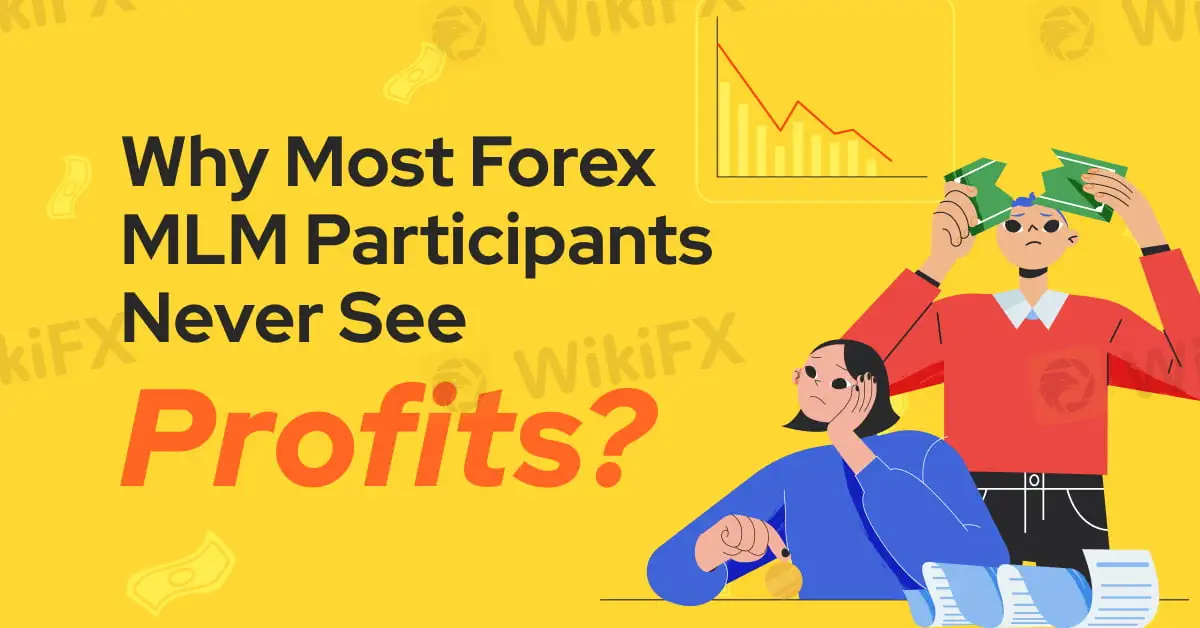简体中文
繁體中文
English
Pусский
日本語
ภาษาไทย
Tiếng Việt
Bahasa Indonesia
Español
हिन्दी
Filippiiniläinen
Français
Deutsch
Português
Türkçe
한국어
العربية
Why Most Forex MLM Participants Never See Profits?
Abstract:Forex-related MLMs have garnered significant attention, often for the wrong reasons. These Multi-Level Marketing (MLM) schemes typically promise participants substantial profits through foreign exchange (forex) trading, but the reality is often quite different. Here's a closer look at the phenomenon:

Forex-related MLMs have garnered significant attention, often for the wrong reasons. These Multi-Level Marketing (MLM) schemes typically promise participants substantial profits through foreign exchange (forex) trading, but the reality is often quite different. Here's a closer look at the phenomenon:

Forex-related MLMs operate on a classic pyramid scheme model, where participants earn commissions not only from their own trading but also from recruiting others into the program. In theory, this creates a lucrative income stream for those at the top. However, the vast majority of participants, especially those at the bottom of the pyramid, struggle to make any significant profits. This structure encourages aggressive recruitment over actual trading success.

One of the hallmarks of forex-related MLMs is their tendency to make exaggerated claims about the potential for profit. They often showcase testimonials from top earners, flaunt luxurious lifestyles, and use high-pressure sales tactics to convince newcomers that they can achieve similar success. In reality, most members do not see the promised returns and are left with little to show for their investments.

Forex-related MLMs often rebrand themselves regularly in response to increasing scrutiny from regulators and negative media coverage. The rebranding efforts often include tweaking their marketing strategies and product offerings to avoid legal repercussions. However, the core business model remains largely the same, with an emphasis on recruitment over actual forex trading education.

Forex-related MLMs have faced numerous investigations and legal challenges from regulatory bodies. The U.S. Commodity Futures Trading Commission (CFTC) and other international regulators have scrutinized these companies for misleading practices and the unrealistic promises made to participants. Despite these challenges, many such companies continue to operate, often shifting focus to regions with less stringent regulatory oversight.

For most participants, joining a forex-related MLM results in financial loss rather than gain. The complex compensation structures, high costs of entry, and the need to recruit constantly create an environment where only a small percentage of individuals, usually those at the very top, see any real profits. The majority, lured by the promise of easy money, often end up disillusioned and financially worse off than when they started.
Forex-related MLMs represent a troubling trend in the financial world. While they claim to offer education and opportunities in forex trading, their true focus lies in recruitment and the perpetuation of a pyramid-like structure. Potential participants should exercise caution, thoroughly research these schemes, and be aware of the high likelihood of financial loss.

Disclaimer:
The views in this article only represent the author's personal views, and do not constitute investment advice on this platform. This platform does not guarantee the accuracy, completeness and timeliness of the information in the article, and will not be liable for any loss caused by the use of or reliance on the information in the article.
Read more

Will natural disasters have an impact on the forex market?
The forex market is known for its rapid responses to global events, but the influence of natural disasters, such as earthquakes and typhoons, can be less straightforward. While headlines may scream about catastrophic damage and economic disruption, the long-term effects on currency values often depend on a blend of immediate shock and underlying economic fundamentals.

Navigating the Intersection of Forex Markets, AI Technology, and Fintech
The financial world is transforming, driven by the rapid integration of artificial intelligence (AI) and innovative fintech solutions. This change is most apparent in forex markets, where algorithmic trading and deep learning are redefining strategies, risk management, and decision-making. In this article, we explore how AI-driven technologies are not only revolutionizing forex trading but are also propelling fintech innovations that enhance customer experiences, bolster security, and unlock new market opportunities.

The One Fear That’s Costing You More Than Just Profits
The fear of missing out (FOMO) is NOT what you think it is! Read the three lesser-discussed components that contribute greatly to FOMO trading!

Why More People Are Trading Online Today?
Discover why online trading is booming with tech, AI, and a push for financial freedom. From stocks to crypto, it’s a thrilling hustle for all.
WikiFX Broker
Latest News
How Crypto Trading Transforms FX and CFD Brokerage Industry
UK would not hesitate to retaliate against US tariffs - No 10 sources
FCA Warns Against 10 Unlicensed or Clone Firms
CySEC Warns Against 14 Unlicensed Investment Websites
Top Currency Pairs to Watch for Profit This Week - March 31, 2025
Will natural disasters have an impact on the forex market?
Philippines Deports 29 Indonesians Linked to Online Scam Syndicate in Manila
Navigating the Intersection of Forex Markets, AI Technology, and Fintech
Exposed: Deceptive World of Fake Trading Gurus – Don’t Get Fooled!
AI-Powered Strategies to Improve Profits in Forex Trading
Currency Calculator







